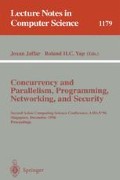Abstract
The partial stable models of a logic program form a class of models that include the (unique) well-founded model, total stable models and other two interesting subclasses: maximal stable models and least undefined stable models. As stable models different from the wellfounded are not unique, DATALOG¬ queries do not in general correspond to functions. The question is: what is the expressive powers of the various types of stable models when they are restricted to the class of all functional queries? The paper shows that this power does not go in practice beyond the one of stratified queries, except for least undefined stable models which, instead, capture the whole boolean hierarchy \(\mathcal{B}\mathcal{H}\). Finally, it is illustrated how the latter result can be used to design a ”functional” language which, by means of a disciplined usage of negation, allows to achieve the desired level of expressiveness up to \(\mathcal{B}\mathcal{H}\)so that exponential time resolution is eventually enabled only for hard problems.
Work partially supported by a European Union grant under the EU-US project “DEUS EX MACHINA: non-determinism for deductive databases” and by a MURST project “Sistemi formali e strumenti per basi di dati evolute”.
Preview
Unable to display preview. Download preview PDF.
References
S. Abiteboul and V. Vianu, ”Datalog Extensions for Databases Queries and Updates”, in JCSS, 43, pages 62–124, 1991.
Abiteboul S., Hull R., Vianu V., Foundations of Databases, Addison-Wesley, 1994.
Abiteboul S., Simon E., and V. Vianu, ”Non-deterministic languages to express deterministic transformations”, Proc. ACM PODS Symp.,1990, pp. 218–229.
Chandra, A., and D. Harel, ”Computable Queries fo relational Databases”, JCSS 21, 1, 1980, pp. 156–178.
Chandra, A., and D. Harel, ”Structure and Complexity of Relational Queries”, JCSS 25, 1, 1982, pp. 99–128.
Eiter T., Gottlob G. and H. Manila, ”Expressive Power and Complexity of Disjunctive DATALOG”, Proc. ACM PODS Symp., 1994.
Fagin R., ”Generalized First-Order Spectra and Polynomial-Time Recognizable Sets”, in Complexity of Computation (R. Karp, Ed.), SIAM-AMS Proc., Vol. 7, 1974, pp. 43–73.
Gelfond M., and V. Lifschitz, ”The Stable Model Semantics for Logic Programming”, Proc. 5th Int. Conf. and Symp. on Logic Programming, 1988, pp. 1070–1080.
S. Greco, S. Ganguly, and C. Zaniolo. ”Extrema Predicates in Deductive Databases”, Journal of Computer and System Science, No. 51, 1995, pp. 244–259.
Greco S., Saccà D. and C. Zaniolo, ”DATALOG Queries with Stratified Negation and Choice: from \(\mathcal{P}\)to \(\mathcal{D}^p\)”, In Proc. Fifth Int. Conf. on Database Theory, 1995.
Greco S. and Saccà D., ”Possible-is-Certain: is Desirable and can be Expressive”. submitted to Annals of Mathematics and Artificial Intelligence, 1996.
Greco S. and Saccà D., ”A Query Language that Captures the Query Hierarchy”, unpublished manuscript, 1995.
Immerman N., ”Languages which Capture Complexity Classes”, SIAM Journal on Computing 16, 4, 1987, pp. 760–778.
Johnson D.S., ”A Catalog of Complexity Classes”, in Handbook of Theoretical Computer Science, Vol. 1, North-Holland, 1990.
Kolaitis P.G. and C.H. Papadimitriou, ”Why not Negation by Fixpoint?”, JCSS 43, 1991, pp. 125–144.
Lloyd J.W., Foundations of Logic Programming, Springer Verlag, Berlin, 1987.
Marek W. and M. Truszcynski, ”Autoepistemic Logic”, Jou. ACM 38, 3, 1991.
Papadimitriou C.H., Computational Complexity, Addison Wesley, 1994.
Przymusinski T.C., “Well-founded Semantics Coincides with Three-valued Stable Semantics”, Foundam. Inform. 13, 1990, pp. 445–463.
Saccà D., ”The Expressive Powers of Stable Models for Bound and Unbound DAT-ALOG Queries”, JCSS (to appear).
Saccà D., and C. Zaniolo, ”Stable Models and Non-Determinism in Logic Programs with Negation”, Proc. ACM PODS Symp., 1990, pp. 205–218.
Saccà D., and C. Zaniolo, ”Deterministic and Non-Deterministic Stable Models”, submitted for publication, 1995.
Schlipf J.S., ”The expressive powers of the logic programming semantics”, Proc. ACM PODS Symp., 1990, pp. 196–204.
Vardi M.Y., ”The Complexity of Relational Query Languages”, Proc. ACM Symp. on Theory of Computing, 1982, pp. 137–146.
Van Gelder A., Ross K., and J.S. Schlipf, ”The Well-Founded Semantics for General Logic Programs”, Jou. ACM 38, 3, 1991, pp. 620–650.
Author information
Authors and Affiliations
Editor information
Rights and permissions
Copyright information
© 1996 Springer-Verlag Berlin Heidelberg
About this paper
Cite this paper
Greco, S., Saccà, D. (1996). The expressive power of “possible-is-certain” semantics. In: Jaffar, J., Yap, R.H.C. (eds) Concurrency and Parallelism, Programming, Networking, and Security. ASIAN 1996. Lecture Notes in Computer Science, vol 1179. Springer, Berlin, Heidelberg. https://doi.org/10.1007/BFb0027777
Download citation
DOI: https://doi.org/10.1007/BFb0027777
Published:
Publisher Name: Springer, Berlin, Heidelberg
Print ISBN: 978-3-540-62031-0
Online ISBN: 978-3-540-49626-7
eBook Packages: Springer Book Archive

